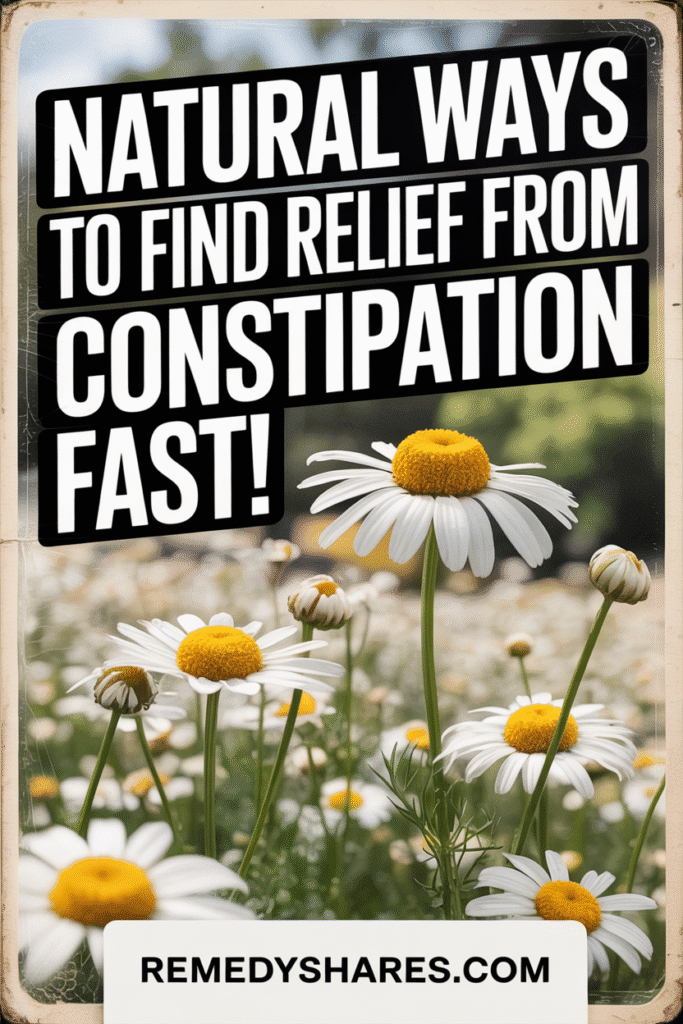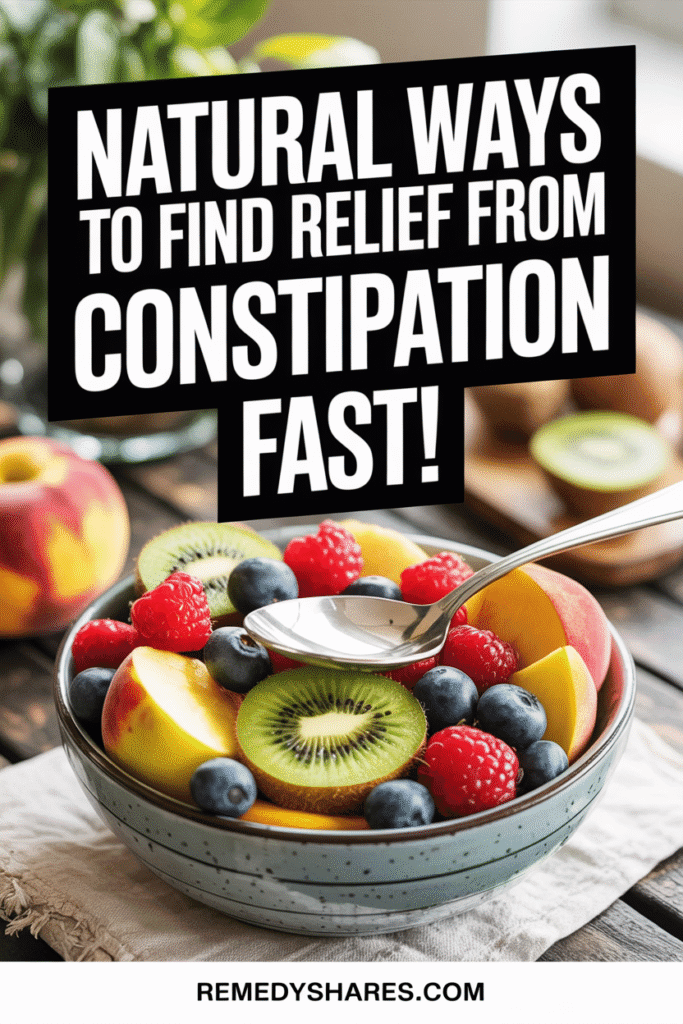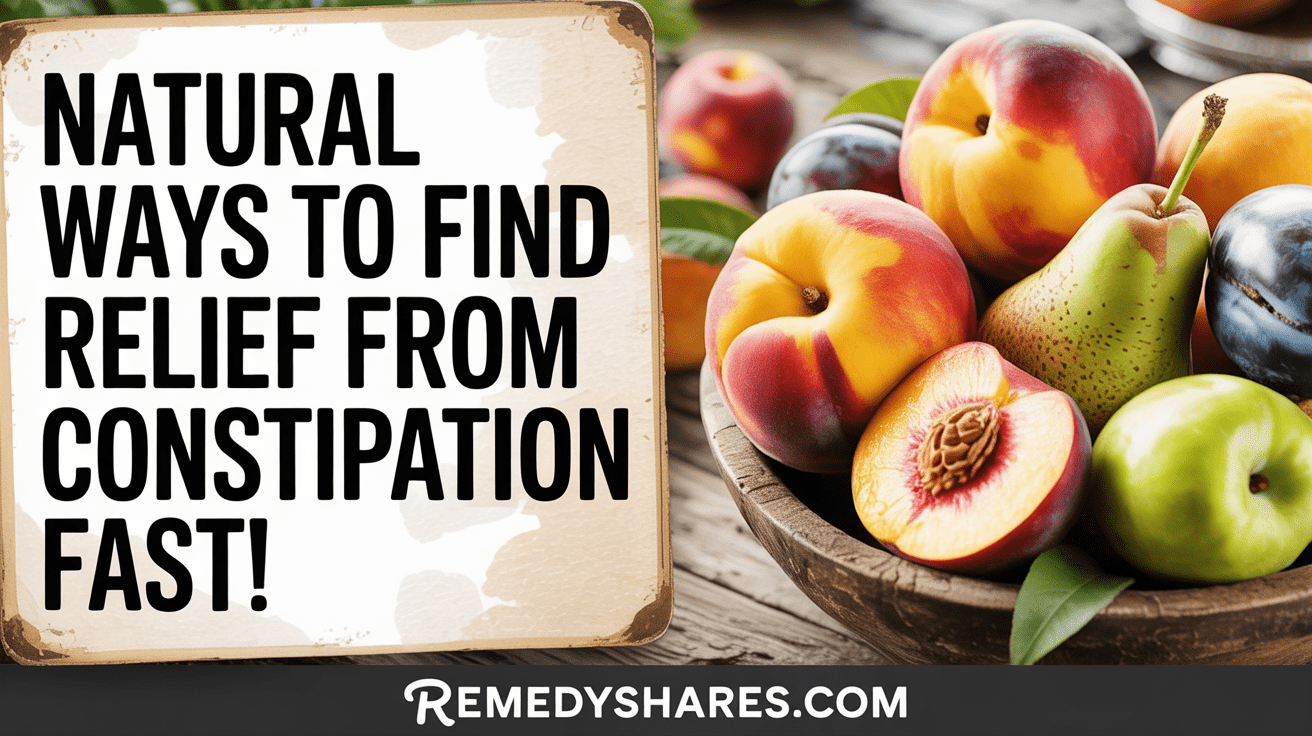Feeling bogged down? Literally? If you’re looking for some relief when your digestive system isn’t cooperating, you’re definitely not alone. Constipation is a super common issue, and it can leave you feeling bloated, uncomfortable, and just plain frustrated.
Sometimes, you need something that works pretty quickly. Good news: there are powerful natural solutions you can explore to get things moving again.
Understanding What’s Happening
So, why does this happen? Constipation occurs when your digestive system slows down or gets a bit blocked up, making it tough to have regular bowel movements.
What causes this slowdown? Often, it’s tied to simple things like not getting enough fiber in your diet, not drinking enough water, skipping physical activity, or even just putting off going when you feel the urge. Stress, certain medications, or even just a change in your daily routine can also trigger it.
You’ll notice symptoms like having fewer than three bowel movements a week, really straining when you try to go, or passing hard, dry stools. You might also feel abdominal pain, bloating, or like you haven’t fully emptied your bowels. When these symptoms pop up, it’s smart to address them quickly to help your digestive health get back on track.
Why Fiber is Your Digestion’s Best Friend
When we talk about natural ways to find relief, fiber is absolutely essential. It’s a powerful aid for your digestive system.
Fiber works by soaking up water, which adds bulk to your stool. This makes it softer and much easier to pass through your system.
You’ll find two types working together for the best results. Soluble fiber, in foods like oats and fruits, helps soften things up. Insoluble fiber, found in whole grains and veggies, adds that crucial bulk and helps move things along faster.
For quicker relief, aim for 25-35 grams of fiber daily. Think chia seeds, leafy greens, and prunes. Just remember this is key: you must increase your water intake when you boost fiber to avoid discomfort.
Simple Hydration Strategies
Proper hydration is truly a cornerstone of finding quick relief. When you’re well-hydrated, your body can move waste more efficiently through your digestive tract.
You’ll likely feel better faster by trying these hydration tips:
- Start your day with warm lemon water. It’s a great way to kickstart digestion.
- Drink at least 8 glasses of water throughout the day, ideally between meals.
- Consider adding electrolyte-rich coconut water to your afternoon.
- Sip on herbal teas like peppermint or ginger before bed.
Combining these hydration techniques with your fiber intake can often make a noticeable difference pretty quickly.
Powerful Natural Laxative Foods
Beyond just staying hydrated, certain foods are known to naturally stimulate your digestive system.
You’ll find powerful natural laxatives in foods like prunes, figs, and kiwis. They contain compounds that really help promote bowel movements.
Adding chia seeds and ground flaxseeds to your breakfast can boost your fiber intake and give you healthy omega-3s. Don’t forget leafy greens like spinach and kale; they have magnesium, which helps relax your intestinal muscles.
For a quick fix, try eating a ripe pear or apple with the skin. They contain sorbitol and pectin, which are great for digestion. Also, sipping ginger or mint tea can help reduce bloating and stimulate digestive enzymes.
Essential Oils and Herbs
Some essential oils and herbs can offer natural support when used appropriately.
These natural solutions can be especially effective when you combine them with staying hydrated and making dietary changes. Many have been used for a very long time across different cultures.
- Peppermint oil: Dilute it and gently massage it onto your abdomen. It can help relax digestive muscles.
- Ginger: You can brew it as a tea or take supplements. It helps stimulate digestion and ease bloating.
- Fennel seeds: Try chewing on them after meals or making a tea from them to help with digestive discomfort.
- Senna leaves: Using senna as a tea before bedtime can provide gentle overnight relief.
Just a heads-up: it’s best to start with small amounts when trying these, as your body might be sensitive. If you’re using essential oils, always dilute them with a carrier oil before putting them on your skin.
Get Moving with Exercise
Physical activity is really crucial for helping with constipation. It stimulates your digestive system and encourages regular bowel movements.
You can find relief through simple exercises like a brisk 15-minute walk or trying 30 minutes daily of brisk walking, jogging, or cycling.
Here are some specific movements that can help get things going:
- Lie on your back and gently bring your knees to your chest, holding for 30 seconds.
- Follow this with cat-cow yoga poses, which can help massage your intestines.
- Even just a few minutes of jumping jacks or using a mini-trampoline can work wonders for digestive flow.
Staying consistent with your exercise routine is important. Many people find that regular movement is one of the best natural ways to keep healthy bowel habits.
Knowing When to Call the Doctor
While natural remedies and exercise can help in most cases, there are certain symptoms you shouldn’t ignore. They could signal a more serious underlying condition.
Contact your doctor right away if you experience:
- Severe abdominal pain that doesn’t go away or gets worse.
- Blood in your stool or dark, tarry stools.
- Constipation that lasts longer than three weeks.
- Unexplained weight loss happening alongside constipation.
These could be warning signs for conditions like bowel obstruction, inflammatory bowel disease, or other serious issues.
Your Questions Answered
Let’s touch on some common questions about using natural remedies.
Can Natural Remedies Affect My Medications? You’ll definitely want to check with your doctor before trying natural remedies if you’re taking any prescription drugs. They can potentially interact with things like blood thinners, heart medications, or antibiotics.
How Long Should I Wait Before Trying a Different Remedy? It’s a good idea to wait at least 24-48 hours between trying different natural options. This helps you see which one might be effective for you. If your symptoms are still persistent, it’s best to get guidance from your healthcare provider.
Are Natural Remedies Safe During Pregnancy? Again, check with your doctor before trying any natural constipation remedies if you are pregnant. Some herbs and supplements aren’t safe during pregnancy, though gentle options like prunes are usually okay.
Can Children Use These Same Remedies? You need to be extra careful with children. While some natural solutions might work for both kids and adults, it’s crucial to consult your pediatrician to get safe, age-appropriate options for your little one.
Will Natural Remedies Stop Working Over Time? You might find that natural remedies can become less effective if used too regularly. It’s often best to rotate different remedies and focus on addressing the core reasons behind your constipation for long-term benefits.
Finding relief is important, and natural approaches can be a big help for many people. By focusing on fiber, staying hydrated, choosing the right foods, incorporating gentle movement, and knowing when to seek medical advice, you can often get your digestive system back on track. Stay well and keep making healthy choices!




